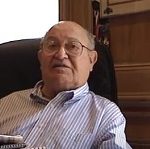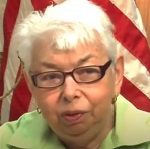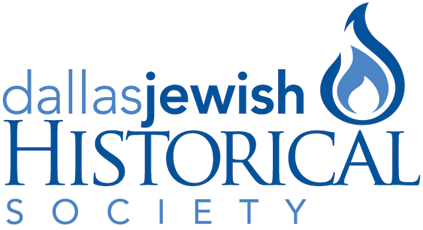by Bryan Cytron | Apr 7, 2015 | 1920s and Earlier, Video Oral History |
 In preparation for June 6, 2004, the 60th anniversary of the Allied invasion of Normandy known as D-Day, Dave Andres z”l shared his memories from age 19 of watching the invasion from the English Channel while serving with the U.S. Navy. Born in Dallas, TX, on April 24, 1925, to Chaya Ruchel and Harry Andres, Dave was drafted into the Navy at 18 and trained in Balboa Park in California. Following his naval service, he returned to Dallas and studied at SMU. Dave eventually became the founder of Dave Andres Real Estate and was a longtime member of Temple Emanu-El. He was a dedicated supporter of Dallas Hebrew Free Loan Association, a baseball coach at the JCC and Dallas Metro YMCA, and, along with his wife, Ruth, helped the Dallas Jewish Historical Society through their financial and hands-on generosity. Dave passed away on December 30, 2004.
In preparation for June 6, 2004, the 60th anniversary of the Allied invasion of Normandy known as D-Day, Dave Andres z”l shared his memories from age 19 of watching the invasion from the English Channel while serving with the U.S. Navy. Born in Dallas, TX, on April 24, 1925, to Chaya Ruchel and Harry Andres, Dave was drafted into the Navy at 18 and trained in Balboa Park in California. Following his naval service, he returned to Dallas and studied at SMU. Dave eventually became the founder of Dave Andres Real Estate and was a longtime member of Temple Emanu-El. He was a dedicated supporter of Dallas Hebrew Free Loan Association, a baseball coach at the JCC and Dallas Metro YMCA, and, along with his wife, Ruth, helped the Dallas Jewish Historical Society through their financial and hands-on generosity. Dave passed away on December 30, 2004.
Click here to watch his video.
by Bryan Cytron | Apr 7, 2015 | 1930s, Video Oral History |
 Betty Ann “Bebe” Ablon was born in 1938 in Boston, Massachusetts. Bebe and her family had moved to Dallas by the time she completed high school. Afterwards, she attended SMU as one of three Jewish girls at the time, graduating as an English major. Bebe went to graduate school to work in community centers. She also worked for Hope Cottage, an adoption service agency, ultimately becoming the Vice President. Bebe belongs to the National Council of Jewish Women and Temple Emanuel and is engaged with the well-being of Dallas’s Jewish Community.
Betty Ann “Bebe” Ablon was born in 1938 in Boston, Massachusetts. Bebe and her family had moved to Dallas by the time she completed high school. Afterwards, she attended SMU as one of three Jewish girls at the time, graduating as an English major. Bebe went to graduate school to work in community centers. She also worked for Hope Cottage, an adoption service agency, ultimately becoming the Vice President. Bebe belongs to the National Council of Jewish Women and Temple Emanuel and is engaged with the well-being of Dallas’s Jewish Community.
Click on the image to watch the video, or click here.
by debrap | Apr 3, 2015 | 1920s and Earlier |
Passover was really something . . . I don’t wonder now that woman do not live to a ripe old age. I think that one day could have shortened a woman’s life by 20 years . . . really what they went through, chickens by hand, you know, and 5 or 6 chickens and you couldn’t do it beforehand because there was no freezing, there was just an ice chest and you tried to preserve that 50 lbs or 75 lbs of ice if you had a very large refrigerator by wrapping it in newspaper.. Everything had to be done that day or the day before, you know, and no one had several sets of silver so you kashered that silver by taking it out in the yard and digging a hole and you heated a flat iron (such as I have sitting here in the hall as a doorstop) and then you put it down in the hole and covered up the silver.
Of course there were no electric mixers, you beat that cake by hand. There was nothing prepared, I mean nothing. You can get anything you want now, cake mixes or just anything you want, and d they were not packed in individual boxes, you know in pound boxes or 12 ounce or whatever. It came in a great big large box and also matzo meal, you got it in a sack and if it was a 10 pound sack and you just wanted 5 pounds, well you got 5 pounds in that sack and 5 in another sack for someone else who wanted it. Of course, your fish, you did not even have it scaled. You had to scale it yourself because if you went to one of the two fish markets here . . . they were both across the street from the old Sanger’s down on Lamar. You didn’t let them touch it with their scaler so you scaled the fish you know and you had to cut it off and so forth and so on.
I recall that when you wanted to re-line your shelves we used to go down to the Dispatch which was one newspaper which is now defunct and get newspapers, printed newspapers in great big bundles and carried them from Patterson to where we lived down at that time at Beaumont. We didn’t know any better and because you didn’t use print because that was chametz. That is when you really knew it was also Passover, and it smelled like Passover, and you knew it was Passover.
Now I said the only place you could get matzo was from Mr. Byers. Well, Mr. Walls (?) . . . was at the temple, had the franchise and they were little round matzos, you know. They were not the square ones such as we know. They were the little round ones. . . then you had to [make] your horseradish. There was no [commercial brands] and believe you me, my mother used to take it outside [and] grate it. It popped your nostrils open because I remember when I was a child I put my head down in the crock and took a whiff and it almost destroyed me. I couldn’t get my breath back and there was no vinegar or anything like that. You let your wine sour and you had to make your wine. You didn’t go to the liquor store and buy a bottle of Passover wine, you made your wine. In the fall when the concord grapes were available, you made your Passover [wine]. Everybody had their Passover wine. It is hard to be a Jew. It was hard to be a Jew. Believe you me, it was. You know when we had the seder, well we used to have very large pillows, those European pillows, I remember that time, and my mother had them on the chair and my father really, you know, but there is nothing like that anymore. It smelled Passover. It smelled Passover. Somehow or another it just, you know, I think we remember more, as much by odors, by having an odor come back to us, that brings memories . . . We used fleishig (meat) all together. There was no coffee. We drank tea, you know, and you could not buy any shortening or oil. You had to make your Pesach and mother started to, as she said, to gather up her Passover. That was all that was available and you had to make your chickens Passover that that you used the schmaltz from. You cleared out your kitchen so you made Passover many times in a certain corner where the schmaltz was prepared.
 In preparation for June 6, 2004, the 60th anniversary of the Allied invasion of Normandy known as D-Day, Dave Andres z”l shared his memories from age 19 of watching the invasion from the English Channel while serving with the U.S. Navy. Born in Dallas, TX, on April 24, 1925, to Chaya Ruchel and Harry Andres, Dave was drafted into the Navy at 18 and trained in Balboa Park in California. Following his naval service, he returned to Dallas and studied at SMU. Dave eventually became the founder of Dave Andres Real Estate and was a longtime member of Temple Emanu-El. He was a dedicated supporter of Dallas Hebrew Free Loan Association, a baseball coach at the JCC and Dallas Metro YMCA, and, along with his wife, Ruth, helped the Dallas Jewish Historical Society through their financial and hands-on generosity. Dave passed away on December 30, 2004.
In preparation for June 6, 2004, the 60th anniversary of the Allied invasion of Normandy known as D-Day, Dave Andres z”l shared his memories from age 19 of watching the invasion from the English Channel while serving with the U.S. Navy. Born in Dallas, TX, on April 24, 1925, to Chaya Ruchel and Harry Andres, Dave was drafted into the Navy at 18 and trained in Balboa Park in California. Following his naval service, he returned to Dallas and studied at SMU. Dave eventually became the founder of Dave Andres Real Estate and was a longtime member of Temple Emanu-El. He was a dedicated supporter of Dallas Hebrew Free Loan Association, a baseball coach at the JCC and Dallas Metro YMCA, and, along with his wife, Ruth, helped the Dallas Jewish Historical Society through their financial and hands-on generosity. Dave passed away on December 30, 2004.

Recent Comments